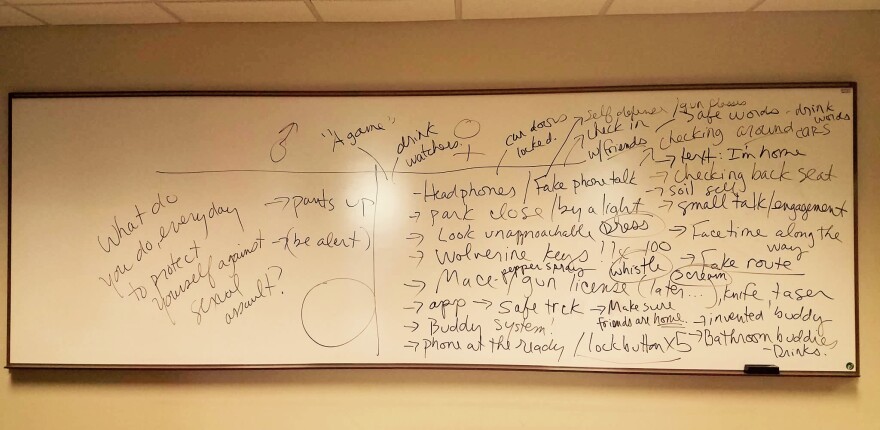So …. how are those New Year’s resolutions coming along? After an enraging political year full of marching and hollering myself hoarse, I’ve been trying something new — shutting up and listening. Experts back me up. Psychologist David DeSteno wrote in a recent New York Times column that compassionate listening strengthens all our happiness muscles. And educator Parker Palmer reminds us: “The human soul doesn’t want to be advised or fixed or saved. It simply wants to be witnessed — to be seen, heard and companioned exactly as it is.”
But it’s interesting how hard it can be simply to listen to other people, who are, after all, authorities on their own lives.
Like any reflective teacher, I learn from my students, who show me, continually, the power of compassionate listening. Here’s an example. I taught an Introduction to Gender Studies course last semester — 36 students from widely varying backgrounds and majors, all just earning a general education credit. Because the #Me Too movement was just erupting, students often came to class on fire about the latest news of powerful men brought down by predatory behaviors. Of course, these abuses don’t just happen in Hollywood, journalism, or politics. They happen everywhere,which is the point of the MeToo hashtag, as well as the Time’s Up movement, heralded by a blackout of sartorial outrage and Oprah's anthem of a speech at the Golden Globes.
I opened our Gender Studies class one day with a simple exercise, not original to me, that I expected would take about 5 minutes. It took 75. I wrote on the board: “What do you do everyday to protect yourself from sexual assault?" I drew two columns, one for men, and one for women. I called on the men first. There was awkward silence. “Uhhhhh….” Then nervous laughter. A student ran his fingers through his hair in earnest embarrassment and said, “Uh — I keep my pants up?” That elicited some snickers, but by this point the women were on the edge of their seats, hands shooting up.
What followed from the women was an tsunami of strategies, tactics, and survival skills that are second-nature to women socialized in U.S. culture. If you look at the photo of the class whiteboard on the station website, my cramped handwriting shows I could hardly keep up with the torrent of everyday tactics women use to try to keep themselves safe, from hustling through darkened parking lots with “Wolverine keys” sliced between their fingers at the ready, to buddy systems to watch drinks and get home safely, to Face-timing friends during dicey walks, to a range of small weapons tucked into purses. The air was charged. Women were angry, but also seemed vindicated and relieved to share this anger aloud.
And during all of this, the men listened. With humility and grace, they listened. They admitted their surprise, and seem chastened by how much most of them did NOT have to think about their bodily safety every moment of the day. But then they revealed what it felt like to have women, over and over, cross the street to avoid them, or glance at them in fear, and pull purses closer. Then, the women listened, and admitted they often asked male friends to come with them to concerts or to the bars as bodyguards. Some of the men explained, haltingly, how confusing it was to be seen as a predator and a protector — all the time, but not at the same time. We talked about the impact of race, sexuality, and non-binary gender identities on experiences of unsafety. The class period ended with action items — men promising to lead sexual-assault prevention training on campus, and everyone vowing to speak up about daily injustices. The air felt electric with promise. Out of silence: listening, and then action.
So - onward, to a year of compassion, listening, learning, and calling ourselves to action, particularly if we have privilege. We all can commit to reading more diverse voices, scholars can cite more writers of color, news addicts can seek a broader range of sources and perspectives. Locally, you can bone up by attending free public events like the People’s Inauguration II onJanuary 20th at the Islamic Society of Michiana, starting at 4 — diverse groups will share their calls to action. 2018 will require our best selves, folks — it is quite a time to be alive.
For Michiana Chronicles, happy to sign off to Hamilton, this is April Lidinsky.
Music: "The Schuyler Sisters" Hamilton Original Broadway Cast - words and music by Lin-Manuel Miranda









